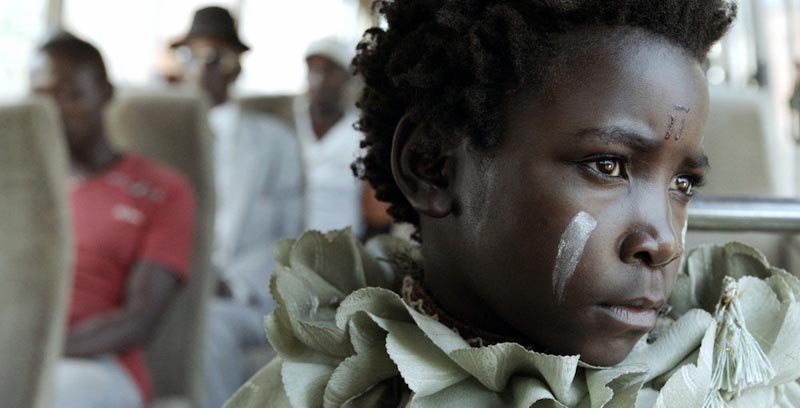By Roger Costa
I AM NOT A WITCH
Brought to the authorities by a group of hatred, scared, superstitious and ignorant Villagers, a young girl is accused of witch-crafting. She listens to the accusations, haunting stories of her allegedly practices, and remains silent, perplexed, with eyes wide open, absorbing each individuals’ throwing stone. A delegate representing the Government becomes responsible for her case, after she spontaneously decides to embrace the region’s feared witch clan, integrating as the youngest among women who are kept imprisoned by long ribbons inside a determined area. In the opening scene of Zambia-born Rungano Nyoni’s sophomore film, a spokesperson for the village, walks the tourists through the area where the “witches” are being kept, displaying them as a patrimony, a group excluded from regular society, yet engaged in their decisions and influential on how to lead their ways. An accomplished writer-director who had been largely praised for her frame work, winning many awards at prestigious festivals, including this year’s BAFTA for Outstanding Debut, Nyoni intimately addresses topics related to child abuse and negligence, as well as a cry-out for stolen childhood. When 8 year-old orphaned Shula is caught up, she finds the opportunity to be part of a broken “family”, ending her process of dealing with abandon; though the circumstances are not favorable, it’s a way of being loved and accepted somehow, while her popularity grows, as she surrenders to the practice of consulting the spirits, approving any idea people create around her. In the other side, there’s the Chief, who sees a gold-mine and uses his power and authority, to persuade the little one into convincing people, with all manipulative resources he can pull out. He takes her across the region, spreading her popularity and connecting with devotees and desperate souls who will pay and believe anything to find answers for their troubles. She is even showcased on national TV where the Chief is confronted by a spectator who questions his integrity and real intentions. Among all these urgent social matters captured by the powerful, delicate, darkly funny and heartbreaking screenplay, the film also brilliantly points to the ignorance, allusion and blindness of most people involved in such cases, as well as a devastating look on how gossip, or the power of accusation can destroy someone’s life- the women are taken away from their families and kept excluded without any further investigation or forgiveness. The use of non-professional actors are evident as most players can’t manage to hold their fragility in front of the cameras, though overall the interpretations are realistic and satisfying. Undeniably firm and confident, Maggie Mulubwa is the best and most impressive performer of them all. In the role of our protagonist Shula, she enlightens the screen, stealing our attention towards her hypnotizing eyes, the silent turbulence and the discreet joy she keeps flowing for herself. Her personification is fantastical and built with the sense of a modern tragic fable where she loses innocence, and it was impressive enough also for the voters at British Independent Film Awards, who enlisted her among the nominees for the Best Actress Prize. Filled with suspense and uncertainty, punctuated by the Violin score, and exquisitely shot, it’s an affecting, and extremely curious look at traditions, rituals, dysfunctional societal standards and child exploitation. (Film Movement. 9/7. Quad Cinema.)

MADELINE’S MADELINE
Writer-Director Josephine Decker’s latest project is a provocative, enigmatic and thrilling exploration on the troubled emotions revolving around a 16 year-old girl, her aggressive behavior and psychological moods. Displaying one of this year’s most intense roles to date, Helena Howard gives a stupendous breakthrough performance, creating all sorts of reactions on the audience, as we witness her perspectives literally from inside of her- her psych displays signals of animals as she transforms herself into one of them. The film is structured on her disturbing relationship to her mother (played by the great Miranda July), with whom she shares a series of misunderstandings, confrontations and unsolved revelations, exposed throughout the back-and-forth editing, also presenting uncomfortable moments of humiliation. An acclaimed selection at Berlin and Sundance, as well as a Top Winner at Sarasota, Montclair and Dallas Film festivals, it’s a haunting human condition work that showcases the talent of a rising-star (it’s impossible not to be blown away by Helena) and bravely examines and justifies this generation’s enduring, ambiguously confused character. (Oscilloscope Laboratories. Playing Exclusively at Quad Cinema.)



















Comments